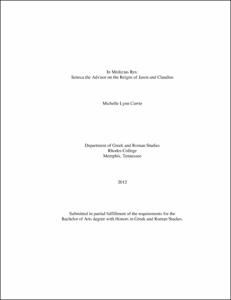Please use this identifier to cite or link to this item:
http://hdl.handle.net/10267/13665Full metadata record
| DC Field | Value | Language |
|---|---|---|
| dc.contributor.author | Currie, Michelle Lynn | - |
| dc.date.accessioned | 2012-05-23T19:26:28Z | - |
| dc.date.available | 2012-05-23T19:26:28Z | - |
| dc.date.issued | 2012-05 | - |
| dc.identifier.uri | http://hdl.handle.net/10267/13665 | - |
| dc.description | The author granted permission for the digitization of this paper. It was submitted by CD. | en_US |
| dc.description.abstract | As an advisor in the imperial household, Seneca wrote tragedies whose portrayal of mythological rulers was doubtlessly influenced by his firsthand experiences. Though scholars have already analyzed instances of historically relevant themes in these tragedies, this new angle sheds light on facets of ruling that are particularly problematic for these first Roman emperors and reveals Seneca’s thoughts on the inner workings of ruling in the early imperial era. Among Seneca’s tragedies, Medea in particular seems concerned with issues of power and ruling. In retelling a story already markedly similar to Claudius’, Seneca naturally remolds this traditional storyline to draw parallels between the situations of these two rulers and issues they face in asserting their power. Both Claudius’ and Jason’s authority is overshadowed as their own families directly impede their rise to power; they face serious difficulties in their relationships with their wives and heirs; they travel even to the ends of the world to assert their control over and seek benefits from foreign lands and peoples; and they must nevertheless rely on others for victory, given their own lack of military ability. The remarkable similarities between Claudius’ and Jason’s circumstances suggest that Seneca noted and wished to draw attention to the political advantages and pitfalls of different aspects of rulers’ dealings with power. These shared trials suggest that decisive resolution of these challenges was necessary for the successful acquisition and maintenance of power, both for the mythological ruler and the historical one whose position Seneca understood so well. | en_US |
| dc.description.sponsorship | This paper was read and approved by Drs. Geoff Bakewell, Susan Satterfield, Lori Garner, and Kenny Morrell. | en_US |
| dc.publisher | Memphis, Tenn. : Rhodes College | en_US |
| dc.rights | Rhodes College owns the rights to the archival digital objects in this collection. Objects are made available for educational use only and may not be used for any non-educational or commercial purpose. Approved educational uses include private research and scholarship, teaching, and student projects. For additional information please contact archives@rhodes.edu. Fees may apply. | - |
| dc.subject | Text | - |
| dc.subject | Honors papers | en_US |
| dc.subject | Greek and Roman Studies | en_US |
| dc.title | In Med(e)as Res: Seneca the Advisor on the Reigns of Jason and Claudius | en_US |
| dc.type | Thesis | en_US |
| Appears in Collections: | Honors Papers | |
Files in This Item:
| File | Description | Size | Format | |
|---|---|---|---|---|
| Currie_Michelle_Honors_2012.pdf | 398.06 kB | Adobe PDF |  View/Open |
Items in DSpace are protected by copyright, with all rights reserved, unless otherwise indicated.